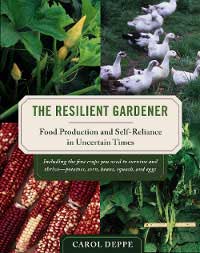The Resilient Gardener: Food Production and Self-Reliance in Uncertain Times
Carol Deppe
ISBN 978-1-60358-031-1
Chelsea Green Publishing
I confess I’m pretty much a good-time gardener. I grow things that are pretty (love unusual limbs and bark) and I’m hardly ever short of flavorful herbs or greens for salad. If my plants are thirsty, I turn on the hose. If my soil needs amending, I dig in some homemade compost or simply head across town in any direction to a nursery or garden center.
But what about gardening in “not-so-good” times, when “ordinary trauma and minor disasters” like health problems and family needs trump the to-do list, or make it impossible to do the things our gardens need precisely when they need them? Or the “mega-hard” times that history proves deserve consideration – catastrophic drought, disasters (natural and man-made,) pandemics, energy shortages, economic instability, the ripple effect of war and terrorism?
“The Resilient Gardener: Food Production and Self-Reliance in Uncertain Times” is a personal revelation about “All-American food security,” and a clarion call to action. Author, plant breeder and scientist Carol Deppe offers a bumper crop of clear explanations about why resilience (“An ability to recover from or adjust easily to misfortune or change” – Merriam-Webster Dictionary) in even the tiniest backyard gardens matters, along with a ton of practical how-to information about growing, processing and storing food for optimal use. Today, Deppe says, “…we can produce better, more nutritious, more delicious food than anything we can buy,” and learning to reduce inputs like labor and water means “we spend less, waste less, pollute less, and are more sophisticated, efficient gardeners, in good times as well as bad.”
And since we humans need calories and protein, not just salads and herbs, “The Resilient Gardener” focuses on “the five crops you need to survive and thrive – potatoes, corn, beans, squash and eggs” – and presents step-by-step approaches to grow, store and use these vital crops.
Deppe offers a big-picture overview of the diverse “erratic-climate-adjusted style of farming” developed during the Little Ice Age and still seen as a “model for a maximally-resilient farming community,” then invites us to better understand the inherent resilience of our own backyards by exploring its soil, topography and traditional uses by Native Americans and pioneers.
She looks at diet and food resilience, sharing how resilient gardening can help with physical limitations, special dietary restrictions and other health considerations like food intolerances. There’s a real value to the foresight that leads to having a “stash” of staples for our families, “designed to primarily enhance the quality of our lives in ordinary times (and) also enhance personal and regional reliance in hard times,” she says. “The Resilient Gardener” details different growing and storage methods, including best temperature and humidity conditions for 49 fruits and vegetables that keep longer than two months. You may know about keeping apples and carrots, but what about celery? Garlic? Jerusalem artichoke? Kohlrabi? Parsnips? Sweet potatoes and (true) yams?
And any gardener who reads the chapter on The Laying Flock will come away with a lust for poultry (Deppe adores her ducks) that goes well beyond quality eggs, garden fertilizer and a handy (beaky?) outlet for produce leavings.
Deppe’s stated goal is to “encourage more gardening, and more growing of food, especially staples.” She urges us all to expand our knowledge and pass it on to nurture resilient neighborhoods, resilient communities, resilient regions and a resilient nation. “The Resilient Gardener” challenges us all to up our gardening game for maximum flexibility, satisfaction and self-reliance … just in case.
With family roots in the fertile Red River Valley of North Dakota, Lynn Torrance Redlin has been part of the Cooking Up a Story team for a number of years. An avid gardener and home cook, Redlin is also a voracious reader, and enjoys exploring new information and ideas about our food system.


